Review for Fruits Basket (2019): The Final Season
Introduction
It’s taken three years, but we’re finally getting the last parts of the Fruits Basket remake on Blu-ray in the UK, and given that this version actually tells the whole story, I’ve been anticipating it with no little relish. The two halves of the first season were released here by Manga Entertainment, the second season was released by Funimation, and now, the Final Season and the Prelude spin-off movie are being released by Crunchyroll. And they’re all the same company. What is it with corporate egos intent on erasing history? It’s like Elon Musk got cloned to become some kind of ubiquitous multiple shadow clone CEO. Anime fans love things to be aesthetically satisfying, and now there will be an OCD emergency whenever they see the Fruits Basket Blu-rays lined up on a shelf, with multiple company logos.
You would think that Tohru Honda has a hard life. She was recently orphaned when her mother was killed in a car accident, and had to move in with her grandfather. It got crowded enough when his family moved back in, but when the house had to be renovated, and there wasn’t enough room at his family’s place, Tohru offered to find somewhere else to live. That turns out to be a tent in the forest. But Tohru is resolutely upbeat, and rather than burden her best friends Uo and Hana, she’s determined to keep her promise to her mother and finish high school, even if it means working her way through school, while living in a tent.
The trouble is that she’s pitched her tent on Soma land. Yuki Soma is in her class at school, the elegant, handsome young man who all the girls swoon over, but who keeps a resolute distance from everyone, never letting himself get too close. It turns out that he comes from an extensive and influential family, and they are surprised to learn that they have a squatter on their land. She’s a squatter they wind up rescuing when her tent is caught in a landslide. It also seems to be serendipitous, as Yuki’s house isn’t the most hospitable of residences, and he and his relative Shigure are badly in need of a housekeeper. The offer of a roof over her head seems heaven sent for Tohru, until Kyo Soma returns from a retreat in the mountains, looking to pick a fight with his eternal rival Yuki, and oblivious to his surroundings. In the ensuing mayhem, disaster strikes, and the Soma family’s darkest secret is revealed.
For the Soma family is cursed. For generations, they have been afflicted with a condition that causes them to transform into the animals of the Chinese Zodiac when hugged by a member of the opposite sex. Yuki is the rat, Shigure is the dog, and following the legend of the animal that was tricked out of the Zodiac (and the cause of Kyo’s antagonism with Yuki) Kyo is the cat. Now Tohru will have to keep their secret if she is to remain among them. But there is far more to the curse than just the cute animals, and as Tohru lives among them, and meets the other members of the Soma clan, she begins to learn the dark truths and tensions that keep them isolated. But if she has the strength of will, she may just be able to help heal these damaged souls, and in the process find a place that she can call home.
The 13 episodes of Fruits Basket The Final Season are presented across 2 Blu-rays and this time with a Crunchyroll logo on the spine.
Disc 1
1. I’ll Hold Another Banquet
2. That’s an Unwavering Truth
3. I Hope it Snows Soon
4. I’m... Home
5. I Mean... You Know, Right?
6. It Was So Foolish
7. That’s Right, It’s Empty
Disc 2
8. I’m Disappointed in You
9. What’s Your Name?
10. I Just Love Her
11. Goodbye
12. You Fought Well
13. See You Again Soon
Picture
Fruits Basket gets a 1.78:1 widescreen 1080p transfer on these two discs, and it’s a world away from that original 2001 version. The high definition image is clear and sharp, detail levels are excellent, and the animation is smooth. You can really see the benefit of all this in the richness of the colours and the quality of the backgrounds and the settings. Compared to the lived in reality of this show, the original was an impressionist’s distillation. The same can be said for the quality and depth of the character designs.
Sound
You have the choice between Dolby TrueHD 5.1 Surround English and 2.0 Stereo Japanese, with subtitles and signs locked during playback. I watched and was happy with the Japanese version, that’s despite me missing Ritsuko Okazaki’s theme songs, Yui Horie’s breakout performance as Tohru Honda, and the original show’s music. The Japanese cast is completely new, and there are some surprising differences when you look at characters like Hatori and Yuki, although not unpleasant. The audio is fine, with no issues to report, and I have to admit that the new theme songs are growing on me (although the final season gets a bit of boy-band angst which doesn’t), while the incidental music is more emotionally evocative. The subtitles are accurately timed and free of typos.
Extras
You get two discs in a BD Amaray case, one on a centrally hinged panel. There is some nice inner sleeve art. Crunchyroll have ditched the slipcover, as if mismatched logos on a shelf weren’t enough for fans to complain about. No digital copy either.
The discs present their content with static menus, and there is a subtle but cute Zodiac animal motif with the menu selections.
The extras are on disc two.
Fruits Basket the Final Season: Voice Actor Panel (39:56) is still one of those Covid safe Zoom affairs.
You get the textless opening and five of the textless closings.
Conclusion
This so rarely happens in anime... an ending. Most anime shows are adapted from ongoing manga or light novel series, so they either just stop mid-story, or the producers contrive an ending which never satisfies, or lives up to the source material. Either that, or to milk a cash cow, the producers deliberately create a cliff-hanger in the hopes of renewal for a new series. The first time around, Fruits Basket was adapted while the manga was in progress and was one of the shows that just stopped... This time, there was a complete story to adapt, and the producers had the space and time to do it justice. And I have to say that it was well worth it. Vicarious tears were flowing for the duration of this release, both happy and tragic.
I have to admit that when the second season concluded, I had wondered how the series could be wrapped up in a final season of just 13 episodes, but it turns out that there wasn’t that much more story to tell, given that the episodes thus far had introduced most of the characters, and set up the relationships between them, the back-stories behind their respective traumas. Season 2 concluded with the big revelation about Akito, the head of the Soma household, and all that’s really left at this point is to expand on their back-story, explain their trauma, which given that Akito is at the centre of the curse, and bugbear to all of the other Soma family members, is key to the whole story.
When we meet Akito’s mother Ren, and learn of Akito’s past, we learn that Akito is just one more traumatised victim of this family’s traditions, and maybe even more tragic than the people that Akito victimises. It’s a sad truism that hurt begets hurt, and abuse begets abuse, and for Tohru to break that cycle of abuse to protect the people she’s come to care about, requires an even bigger sacrifice. Not that it’s all gloom and tears. Fruits Basket has always blended comedy with its tragedy, and this final instalment is no exception. Yuki continues with the school’s student council and its collection of quirky characters, and he’s getting closer to the morose girl Machi as well. The ever infantile Momiji gets a legendary growth spurt in this collection of episodes, and he instantly goes from adorable to lady-killer.
Fruits Basket has always been about the melodrama, able to wring emotion from even mundane situations, but there were a few instances in this finale that I felt that it had stepped across the line into soap opera territory, particularly with one repressed memory plot development, and a sense of small universe syndrome in the storyline that resulted, but given how this story ends, I can even forgive that perceived misstep. Conversely, when it comes to the Zodiac curse, the way it is resolved turns out to be rather mundane, even a non-event when it comes to Tohru’s agency in the story. Although given how the character was ultimately developed, as flawed and fallible as she turned out to be, that was probably the correct direction to take, as opposed to the somewhat Mary Sue perfection that the first adaptation imbued her with.
Best of all, given that the manga story was complete before this second adaptation went into production, it can take all the time it needs to deliver on that ending, following the characters after the emotionally cathartic climax where the curse is finally lifted, as it takes some time for the characters to process that and where possible grow and go forward. And just as in the real world, not everyone gets a happy ending, and not all sins are forgiven. Two and a bit episodes of after-story are very much welcome, and the final scene is just the cherry on the cake.
I loved the original Fruits Basket anime, still do in fact, but this new version has turned out even better. That first version concentrated on the comedy, and really just told half the story, emotionally speaking as well as in terms of the truncated narrative. The second adaptation tells the whole story, and restores the ‘tragi’ to the comedy. It’s an emotionally complete tale as well. And seeing it concluded with this collection of thirteen episodes provides the catharsis that the story demands and deserves. Fruits Basket is a perfect tale, and an instant classic anime. Don’t miss out.
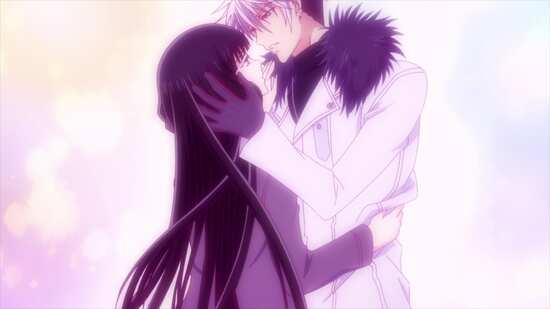
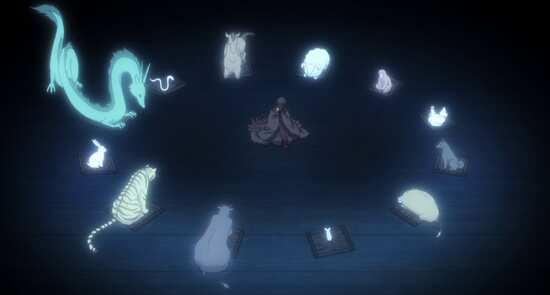
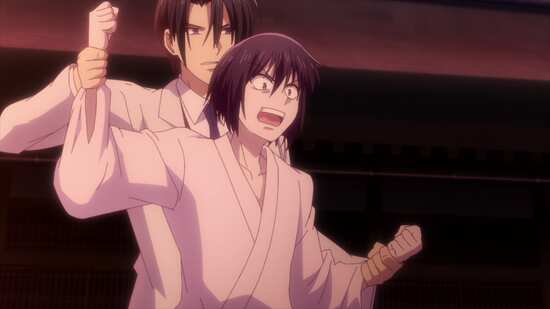
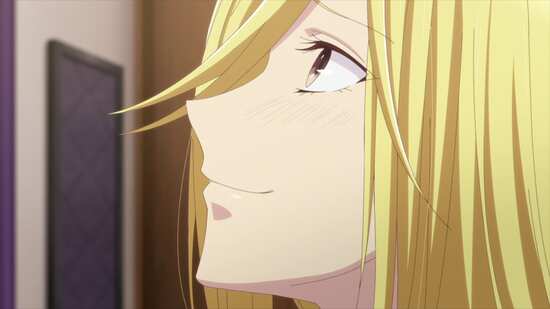
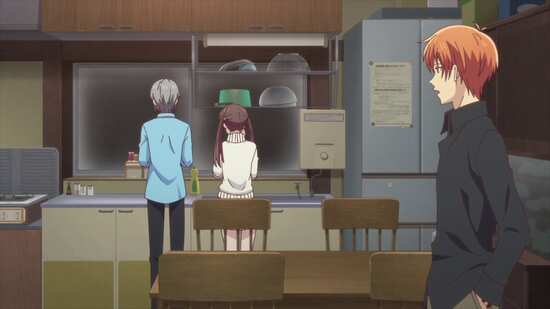
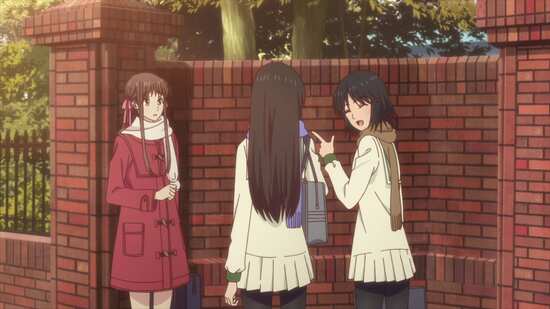
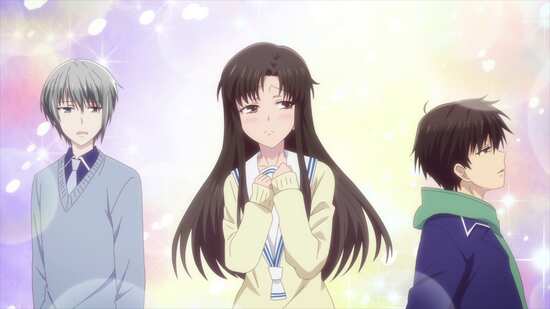
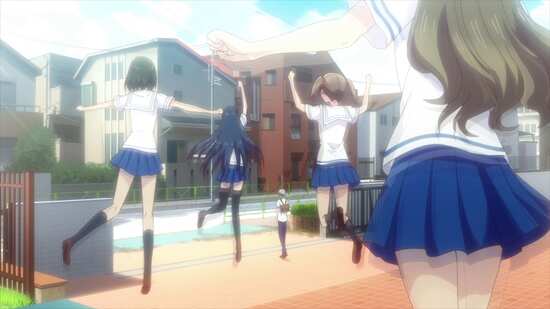
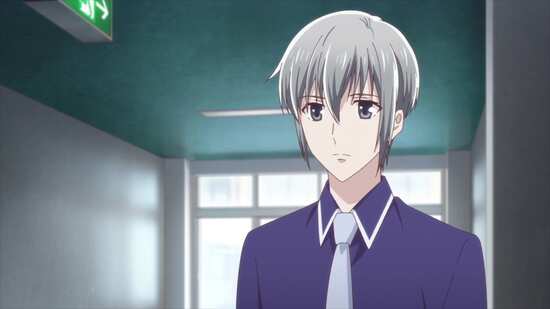
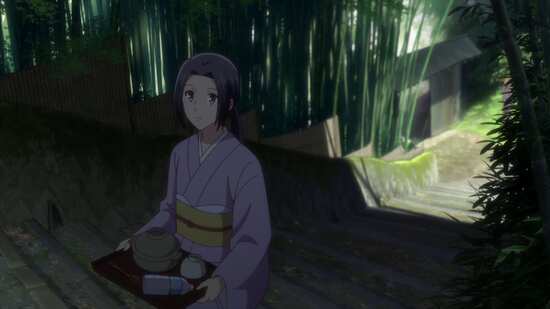
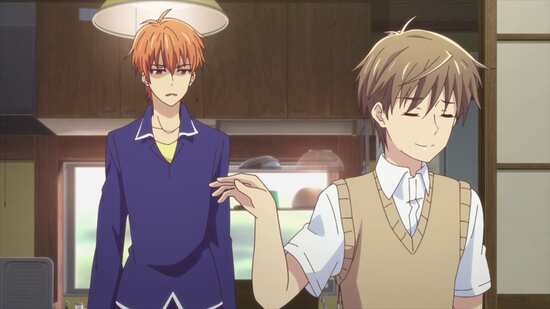
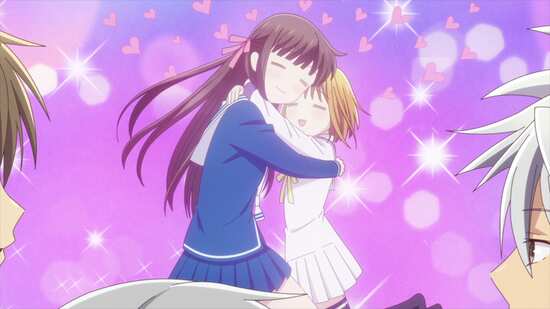
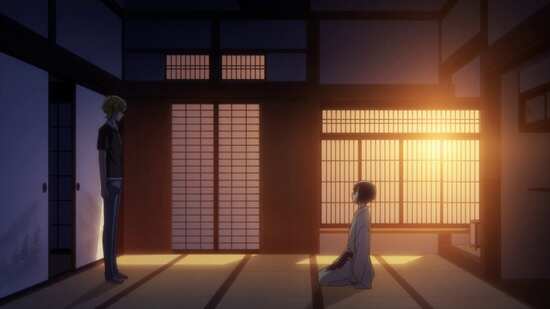
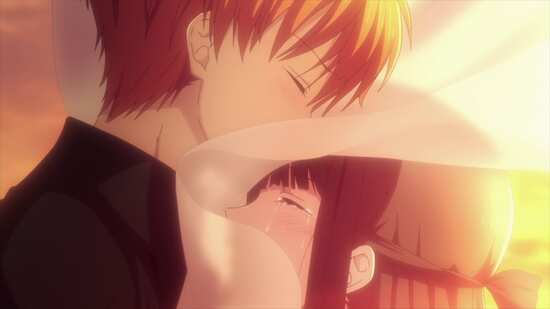
Your Opinions and Comments
Be the first to post a comment!